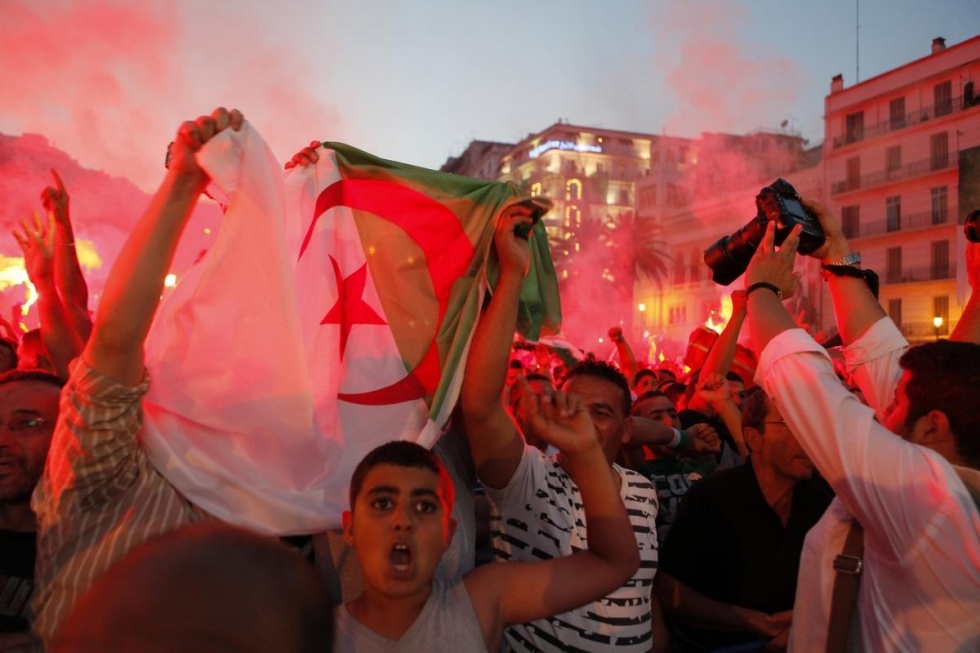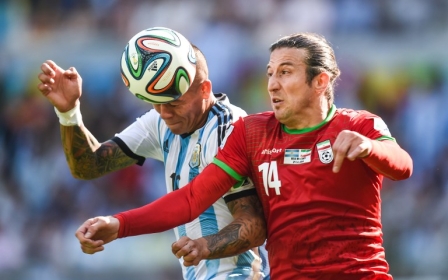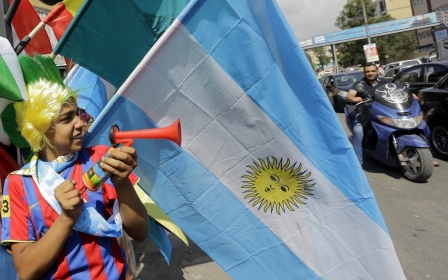One, two, three viva l'Algérie!

After five long, anxious days of watching the global footballing elite ignite the 2014 World Cup, last Tuesday marked the long-awaited opening game of the Algerian national football team - 'Les Fennecs', the Desert Foxes. The Fennec, aptly known for its ability to weather the harshest of environments, is a type of fox found in the Sahara desert, the national animal of Algeria and also the football team’s nickname.
This year’s tournament provides an opportunity for Algeria, the World Cup’s only flag-bearer for the Arab world and North Africa, to make its mark on Brazil and footballing history.
Though by no means the best group in the tournament, the Group H combination of Belgium, Russia, South Korea, and Algeria is widely considered the most evenly matched and competitive across all eight World Cup groups.
The setting for Algeria’s opening match, the Mineirão stadium in Belo Horizonte, a city built on green hills of South-East Brazil, would have had a similar feel to the now distant homeland of the 5,000 travelling fans who painted the city green with their arrival and vibrance.
And the fans had good reason to head into Brazil charged with a sense of optimism. After losing 3:2 in their first-leg World Cup qualifying tie against Burkino Faso, the Desert Foxes snatched victory from the jaws of defeat with a 1:0 home win, that put them through on goal difference. They followed their World Cup qualification with three impressive friendly wins against Slovenia (2:0), Armenia (3:1) and Romania (2:1), scoring seven goals and conceding just two.
For decades, the perpetual Algerian gripe has been that several world class players of Algerian origin were leading other nations to success. Most notably, Zinedine Zidane, arguably the greatest player of his age, led France to win both the World Cup (1998) and the European Championships (2000). Even in this tournament, France’s main talisman is Real Madrid’s Karim Benzema, born to Algerian parents, who netted two in their opening game. If that wasn’t painful enough, France didn't even take Samir Nasri, one of the English Premier League’s best attacking midfielder players last season, whose parents are also Algerian.
This year, however, the picture is rather different. With the only squad where all twenty-three players play for a different club side, Algeria also has the highest number of foreign-born players, standing at fifteen in total. Almost triple that of Switzerland, the second highest with six foreign-born players. In fact, eight of the squad have played for France at international junior level in the past.
A cautious start against Belgium
Their opening tie against Belgium was literally a game of two halves. If the 5,000 travelling fans were Algeria’s twelfth man, then the Brazilian fans were certainly their thirteenth man. It was clear from the beginning that the majority of the 57,000 fans packed into the Mineirao stadium had adopted Algeria as their team, ahead of Belgium.
In the first half, the Desert Foxes showed real promise and were given a well-earned penalty, which Sofiane Feghouli dispatched into the bottom right-hand corner of the goal after being brought down by Tottenham defender Jan Vertonghen. A cautious Algerian outfit held their lead in the first half, largely limiting Belgium to a handful of speculative chances.
A continued lack of Algerian ambition in the second half let Belgium back into the game with a well headed goal from Manchester United’s off-form forward Marouane Fellaini. The Belgian player, born to Moroccan parents, added great impetus to Belgium as it went on to narrowly win the game with a goal in the 80th minute from Dries Mertens after the goal-scorer Feghouli gave the ball away in a sloppy bit of play.
The result was treated with mixed reactions. The Algerian press ran with headlines about a naive Algerian performance. Echorouk praised their performance, but concluded that ultimately 'A lack of experience and cautious tactics punished the Greens', drawing the same conclusion. Elkhabar blamed the defeat on the ultra-cautious defensive strategy adopted by Vahid Halilhodžić, Algeria's Bosnian coach, which at times saw all ten men behind the ball. Ennahar, however, placed the blame squarely on the lack of fire-power and attacking play.
Nevertheless, there appeared to be a collective sense of real optimism. Both Echorouk and Ennahar echo the general public consensus that with more discipline and forward confidence, the current blend of young and experienced players have a great opportunity to take Algeria forward to the next stage of the World Cup. And while it was Sofiane Feghouli who scored Algeria’s goal, the papers highlighted the Goalkeeper, Raïs M'Bolhi, for his outstanding performance.
It was also apparent that the Desert Foxes also have real promise in their stock of young players, such as 24 year old Sofiane Feghouli, whose goal against Belgium was the first to be scored by an Algerian national team player at a World Cup in 28 years. The last goal was scored during their 1:1 draw against Northern Ireland in the 1986 Mexico World Cup when Djamel Zidane drilled a cleverly worked free-kick into the bottom right-hand corner of the goal.
South Korea and the Algerian revival
On Sunday evening, Algeria entered their second tie against South Korea with a real belief that they could get something out of the must-win game. With their 5,000 fans in full voice, sandwiched in with the 43,000 fans in Porto Alegre's Estádio Beira-Rio, and backed by 35 million glued to their televisions in Algeria, the build-up had a feel of history in the making about it.
To address the lack of forward ambition shown in the first match, Halilhodžić made five wholesale changes to the team that played against Belgium. Most notably, he added the forwards Islam Slimani and Abdelmoumene Djabou.
The changes paid off and Algeria added to the raw commitment and passion shown in the first game a touch of panache and skill. On the 26th minute, Islam Slimani showed great strength in placing Algeria ahead after being put through by a glorious long ball from Carl Medjani. Just two minutes later, Rafik Halliche rose high to beat South Korea’s goalkeeper, Jung Sung-ryong, to extend the Desert Fox’s lead. Abdelmoumene Djabou added a third before half-time with a clinical finish inside the 18 yard box.
The beginning of the second half saw a South Korea Korean resurgence after the Taegeuk Warriors shortened Algeria’s advantage with a well-taken goal scored by Son Heung-min after the ball fortuitously hit the back of his head. Algeria increasingly sat deeper and deeper in their own half. It seemed as though South Korea had gained good momentum, until a brilliant bit of Algerian interplay between Feghouli and Yacine Brahimi saw Brahimi extend Algeria’s lead to 4:1 with arguably the best passing goal of the tournament so far. The match then finished 4:2 after Koo Ja-cheol tapped in South Korea’s second inside the six yard box.
The Twitter sphere too was abuzz with the match.
A leap into the unknown
Commenting on the current feeling on the ground in Algeria, Hichem Faycel, a 20 year old Algerian fan living in Algiers said: ''We all felt confident about our chances against South Korea, but could never have imagined in our wildest dreams that we would score so many goals against them!"
''People have been taking to the streets to express their joy and we will all be cheering our brothers on in their next game. With the way they played so far, anything is possible,'' he added.
The historic victory left Algeria joint top in the group as they go into their final group game against an ageing Russian team. Their four goals were not only the highest number of goals scored by Algeria in a World Cup, but the highest number scored by any African country at the world’s premier footballing competition.
Fatiha, a sixty year old Algerian mother of three from Blida, draped from head to toe in Algeria's green and white colours during the match said:
''I felt as though I was there in the stadium with the players. I could feel their every kick and their every emotion. Each time Algeria scored, I joined them in prostration and each time South Korea missed a chance I prostrated in thanks!''
Hanan, a 25 year old student, shared her excitement:
''We're all very excited! Our players played like Argentina and the strikers were like Messi and Ronaldo. Russia are a good team, but we have a real chance to beat them," she said.
''After the win the whole country erupted in joy and everyone was waving flags in the streets. People are ecstatic and proud of how well the team has done. All of us, every Algerian in the world, will be supporting the players against Russia,'' she added.
Their victory firmly places the team on the world map as a force to be reckoned with and was received with tremendous jubilation across Algeria.
"After an unimpressive display against South Korea in their opening tie, an ageing Russia could be Algeria’s for the taking in the humid climate of Curitiba in Brazil’s south region," said Faycel.
"One thing for sure is that the entire nation, perhaps even the whole African continent and Arab world will be joining Algeria’s fans in singing their iconic chant 'One, two, three viva l'Algérie!'''
New MEE newsletter: Jerusalem Dispatch
Sign up to get the latest insights and analysis on Israel-Palestine, alongside Turkey Unpacked and other MEE newsletters
Middle East Eye delivers independent and unrivalled coverage and analysis of the Middle East, North Africa and beyond. To learn more about republishing this content and the associated fees, please fill out this form. More about MEE can be found here.




